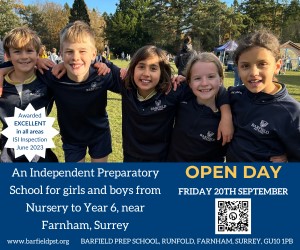How To Avoid The Summer Slide
The summer holidays are well and truly here now - including of course the Great British Summer Weather. After a year of working hard at school, it’s only natural that children want to kick back and relax over the next few weeks - but how do we avoid having them forget everything they’ve learned between now and September? "Summer Slide” is apparently a real thing, and many children arrive at school in September needing to re-learn a lot of the things that were covered in the previous school year. In fact, on average students lose two months of reading skills over the summer.
Here are some simple tips for making sure your children don’t go back to an educational square one this summer.
- Read in the mornings. Don’t wait until your child is exhausted from a fun day of playing; make reading the first thing they do in the mornings. They will be used to learning in the mornings any way and if you can get them into the habit it will make things much easier for you both.
- Summer Reading Challenge https://summerreadingchallenge.org.uk/: This is a great way to get children to keep up with their reading over the summer holidays. Sign up at your local library, and read 6 books during the holidays to get rewards.
- Make everything educational - as much as possible. Get your children to help with the shopping by reading labels etc. Ask older children to read the ingredients, nutritional information etc - or even to add up your shopping basket. Whatever you are doing, try and find a way to bring in reading, maths and any other relevant subject.
- Play games together. Card games and board games are a great way to practice maths, pattern recognition and other skills without realising it.
- Allow screen time - yes really! A little screen time here and there won’t hurt. Download some educational apps to get their brains working.
- Do some exciting experiments. All kids love to make things bubble, pop and explode. Set up a makeshift science lab in your kitchen or back garden and allow their imaginations to run wild. Here are some ideas for experiments.
- Take day trips. Visit museums, art galleries, old cities etc, and actually read the guide books! Talk about history, what you think life may have been like, why you think things look as they do.
- Read to each other. Take it in turns to read a page or chapter each of a book. This makes it a little more fun than just one of you reading to the other. You can make it more fun by adding in props and funny voices.
- Have a project day or week where you learn about a particular country, religion or animal. You can make this fun with themed outings, watching videos, poster making etc.
- Get physically active. It can be tempting to spend a lot of time at home "relaxing” - especially if you have teenagers - but getting out and getting that blood flowing can help to get our brains more active.
- Encourage their hobbies and use them to squeeze in learning. If your child loves superheroes, find superhero books or comics for them to read. If they love Minecraft, get them to read a book about Minecraft, or to plan out a scene from the game.







